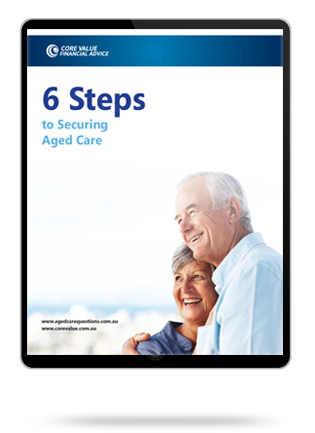Navigating the world of aged care can be daunting, especially when it comes to understanding aged care bonds.
In this article, we’ll break down what aged care bonds are, when you might need to pay one, and the options available if you can’t afford it.
Plus, we’ll explore whether selling your home is a necessary step to cover these costs.
In This Article
Aged Care Bonds Explained
The official name for an aged care bond is a Refundable Accommodation Deposit (RAD). Prior to it being called a RAD, it was called an Accommodation Bond, which is why we colloquially refer to it as an aged care bond.
A Refundable Accommodation Deposit is a lump sum amount paid to an aged care home as part of your cost to reside in that facility. Each aged care home will set their own RAD amount based, usually based on the quality of the home and its geographical location.
Generally speaking, an aged care care RAD in Australia typically ranges from $300,000 to $800,000, though they can vary outside of this range as well.
The RAD is an aged care cost that is in addition to:
- The Basic Daily Care Fee;
- The Means-Tested Care Fee; and any
- Additional Services Fees
Let’s take a look at the specific rules around aged care bonds and how they work.
How is the Aged Care Bond Calculated?
A Refundable Accommodation Deposit is a value set internally by each aged care home. In fact, each aged care home will often have different RAD amounts for different types of rooms within their facility.
They may adjust the RAD amount periodically based on supply and demand factors and are often open to negotiating the RAD on any given day, depending on their availability at the time of your application.
Who Needs To Pay an Aged Care Bond?
Every aged care resident is subject to an aged care bond unless they are classified as a low-means resident. Those with a low-means status will be fully or partially supported and may be required to pay a Daily Accommodation Contribution (DAC) instead.
Assuming you’re not a low-means resident, what happens if you don’t have the financial means to pay an aged care bond?
What Happens if I Can’t Pay a Bond?
Not everyone can afford to pay the advertised Refundable Accommodation Deposit (RAD). So what are your options if you can’t pay the RAD?
If you can’t pay the RAD, you have the option of partially paying the RAD amount or not paying any part of the RAD at all. However, any part of the RAD left unpaid will incur a Daily Accommodation Payment (DAP).
A DAP is calculated as the unpaid RAD amount multiplied by what’s known as the Maximum Permissible Interest Rate (MPIR). The DAP operates in a similar fashion to an interest-only loan.
The maximum permissible interest rate payable on any unpaid RAD amount is 8.36% p.a. for the 1 July 2024 to 30 September 2024 quarter. This MPIR is reviewed every three months.
Here’s an example of what happens if you can’t pay a RAD in full and the application of the DAP.
Example: If the total advertised RAD of an aged care home is $600,000 and you pay $200,000 towards the RAD, there will be an outstanding RAD amount of $400,000 ($600,000 – $200,000). This outstanding amount of $400,000 will be multiplied by the MPIR (8.36% p.a. on 1 July 2024) and divided by 365 to determine the DAP. Therefore, in this instance, the DAP will be ($400,000 x 8.36%)/365 = $91.62 per day.
This $91.62 per day will be payable in addition to the Basic Daily Care fee, the Means-Tested Care fee and any Additional Services Fees.
Although most aged care fees are a daily figure, they are usually billed monthly.
Okay, so let’s say you don’t have enough in the bank account to pay the RAD, but you do still own your home. Are you obliged to sell your home to pay the RAD?
Do I Need To Sell My Home To Pay for the Bond?
There is no requirement to sell your home to pay for an aged care bond. In fact, in some cases there are benefits to retaining your home.
When deciding whether or not to sell your home to pay for the RAD, you might want to consider:
- Other Funds Available – Do you have access to other funds to contribute towards the RAD so that you needn’t sell your home?
- Daily Accommodation Payment (DAP) – Any outstanding RAD amount will require a DAP to be paid at the prevailing interest rate. Are you willing to accept this so that you can retain your home?
- Overall Financial Benefit – Does the net rent, potential capital growth and any beneficial assessment of your home provide a higher financial benefit compared to selling your home and paying the RAD to eliminate the DAP? If not, selling your home should be considered.
- Sentimental/Family Reasons – If it is important to keep the home within your family, or you would like family members to continue to live in the home, then this may be a deciding factor to retain it, even if it doesn’t necessarily provide the most financially beneficial outcome.
Let’s say that you decide to sell the home to pay the RAD, or you have funds available to contribute towards the RAD. How does the aged care home use your RAD and in what instances will it be returned to you?
When Is My Bond Refunded?
When you make a contribution towards the RAD strict rules govern how the aged care home can deploy these funds and the amount paid is guaranteed by the Australian Government, provided the aged care facility you have moved into is approved by the Commonwealth Government.
An aged care home is required to refund your RAD if you choose to move to another home. Specifically, the following refund timeframes apply:
- Giving more than 14 days’ notice means your RAD must be refunded to you on the day you leave.
- Giving up to 14 days’ notice means your RAD must be refunded within 14 days of the day you gave notice.
- Giving no notice means your RAD must be refunded within 14 days after the day you leave.
If you pass away, the aged care home must refund the RAD balance within 14 days of your proof of probate of your Will or letters of administration.
Structuring your contribution towards the RAD taking into account affordability, optimum amount to contribute and the benefits or retaining versus selling the family home can feel overwhelming.
At Core Value Aged Care Advice we will help you navigate the complexities of aged care and find the best financial solutions for your family. If you have any questions or concerns regarding your situation, please call us on 1300 944 011 to speak to an aged care expert.
Frequently Asked Questions
Listed below are some frequently asked questions in relation to aged care bonds.
Do You Get All of Your RAD Back?
If you pass away or move to another aged care facility you will receive all of your RAD back. However, if you have had fees deducted from the RAD during your stay, such as any Daily Accommodation Payments or Additional Services Fees, then the amount received back may be less than the original amount contributed.
Is an Aged Care Bond an Asset?
Any amount contributed to an aged care bond is exempt from assessment under both the Assets Test and Income Test for Centrelink Age Pension purposes. However, it is assessed under the Asset Component for Means-Tested Care fee purposes.
How Can I Avoid Paying RAD in Aged Care?
There is no legal requirement for you to pay for a RAD when moving into residential aged care. However, any RAD amount left unpaid will incur Daily Accommodation Payments. Refer to the above explanation and examples of how this works.
Are Aged Care Bonds Government Guaranteed?
Yes, aged care bonds are Government guaranteed, provided you have moved into an aged care home that is approved by the Commonwealth Government.
Is It Better To Pay RAD or DAP?
Paying a RAD provides you with an effective guaranteed after-tax return equal to the maximum permissible interest rate (MPIR), which is 8.36% p.a. on 1 July 2024. This is the DAP charged on any unpaid RAD. Therefore, you need to determine whether a higher return can be achieved elsewhere if you chose to invest the funds elsewhere – taking into account any favourable assessment of certain assets or a former home.
Further Reading
- Aged Care Bond Refund On Death: How Much Do You Get Back?
- Refundable Accommodation Deposit (RAD)
- What Is Rad and Dap in Aged Care?

Hi, I hope you found this article useful.
If you wish to discuss your situation and what strategies may be of benefit please contact us here
Thanks - Shane


